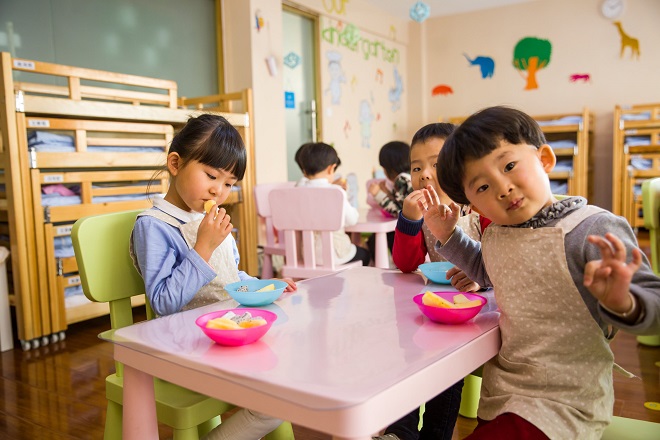Children who represent themselves as well-organized members of the community are more likely to have better grades and higher self-esteem and are more likely to overcome challenges that might otherwise cause them to give up. The school—and even more specifically the preschool is necessary for your child’s development so you will want to do almost anything in your capacity to ensure that the child is ready for school.
Tips to Help Get Your Child Organized
There are five different parts in getting your child organized for school;
Assigning a location for everything
Where you get your child to organize their backpack, school bag, and locker must be kept simple and consistent. If the child has trouble remembering where things are, post pictures around what belongs in which space or buy some storage boxes with clear tops to quickly glance at pictures on the top of each box to remind them where things belong.
Get them involved
Many parents find that involving their children in decorating their study spaces helps them maintain an interest in keeping it clean and clutter-free. You might also consider having your child pick out a color scheme for their desk area by getting one set of sheets/desk cover, etc., in each of his or her favorite colors, so there is something familiar every time they sit down to study.
Expectations
Going back to school can be very overwhelming for children, and this might lead them to feeling less than confident about their ability to do well in class. Help your child set realistic expectations by encouraging them to set small, specific goals that will remind them that mastering the basics is the first step toward future success.
The five-minute rule
If you notice that your child has simply let papers pile up on his or her desk over a few days, schedule a cleaning session together where everyone cleans for 5 minutes and then enjoys an incentive such as watching a favorite movie or playing one board game before doing homework for the rest of the night. This helps keep clutter at bay and also lets your child see the benefits of keeping his room/desk tidy!
Do not get overwhelmed
If you feel like you are spending more time than you’d like cleaning up after your child, consider hiring a professional cleaner to give things a once-over every month or two.
Challenges on organizing Children for School and Tips on overcoming them
Let’s face it – children are not known for being the most organized creatures on this planet. They’re young, they learn quickly, but sometimes they need a little help staying on track. Here are some of the challenges you may experience when organizing your child for school and how you can go about them.
Make it Simple
Children are not known for their ability to prioritize simple tasks. Pick a uniform color scheme and stick with it! Assigning each child’s desk or locker space with only one color helps them easily find where they put things back when they are finished using them.
Play the incentive game
If your children are old enough to comprehend time management skills, consider using incentives as an extra push to help him, or her stay motivated. Some ideas include allowing your child to play his or her favorite computer game after studying for an hour or letting him pick out a special treat from the grocery store on Friday afternoon before heading home from school.
Hire a professional cleaner to do the job for you
If the stress of organizing your child’s work area is taking over, consider hiring a professional house cleaning service that can come in every month or two and give things an extra thorough pick-me-up.
Let creativity dominate
Using organizational tools such as colored plastic bins with clear tops on them will make it easier for your children to find what they are looking for when needed quickly. Keeping colored pencils on hand (one color per bin) is also helpful; this way, everyone knows where the writing utensils are kept, and nothing gets mixed up between desks/lockers!
Try chore charts
If you find that your child needs a little extra help staying organized, consider using a chore chart to help him, or her learn responsibility. The best part about using something like this is that it teaches your children important life lessons such as the value of hard work and setting short-term goals that lead to long-term success.
Patience
Finally, remember to be patient. Remembering why you have allowed your child to have his own space in the first place will go a very long way toward helping you stay focused on what really matters: your son or daughter’s future happiness and well-being. Even if the idea of spending one hour each weekend cleaning up after them feels tedious now, just remember how wonderful clean laundry smells.
Pointers to Remember When Organizing your Child for School
While we all wish we could throw away our children’s toys and magically have them organized, the truth is that there are a few extra steps you can take to help things along. Here is a list of pointers to remember when organizing your child’s room for school.
- Your child is hardly going to take everything but the absolute necessities: Now, this doesn’t imply that your child should leave behind their favorite things, like a loved stuffed animal or special blanket, but ask yourself if they really need all their toys and other items that you’ve decluttered out of their room. It is likely they won’t need half of what was donated in the past month. Whatever does get packed for school will take up very little space and can be compactly stored away at home while your child is at school and the rest of his/her belongings will stay safely at home during this time.
- Knowing how much of each thing they will need: If your child’s backpack and school supplies take up nearly half of their room, chances are they are bringing more stuff than necessary. Ask your child what they plan on using for the New Year and make a note of it all. If pens and pencils rarely go missing, then there’s no need to buy extras as spares. You can also ask their teacher if some items that you think might only be used once or twice a month would actually be needed throughout the year so that you’re not buying things that won’t ever get used.
- Remember to stay positive: While keeping your child organized may feel like a never-ending job at first, just think about how much stress you can take off your shoulders when things are under control. The dividends of a clean workspace over time will pay for themselves many times over!
Common Mistakes you should Avoid while Organizing your Child for School
We also acknowledge that you are not always going to get it right the first time. That is still fine, and you really shouldn’t beat yourself for that. We have rounded up some of the most common mistakes parents make when organizing their children for school so that you can avoid them in the future!
Assumptions
The biggest mistake parents make when organizing their children for school is assuming these tasks are the child’s responsibility. Unfortunately, even if your son or daughter has never-ending energy and enthusiasm, he or she simply doesn’t have enough years of experience under his/her belt to keep everything in order.
Letting go
If you are the type of parent who likes to hold on tight to your child’s schoolwork, consider giving it a little breather every now and again. While many parents assume that any work left at home is vulnerable to theft or destruction by other people in their home, this simply isn’t true! By allowing your son or daughter to take some papers home with them during the week (and then back again for safekeeping over the weekend), they will feel more responsible about what they keep there.
Procrastination
At the end of the day, most homework just needs time and attention in order to be completed correctly. Although you might want to push off working out math problems for tomorrow because family time is more enjoyable tonight, you will be doing both your child and yourself a disservice. Try to remember that a child being organized for school is about having time in the long run!
Too much structure
On the other hand, if you are one of those parents who feel that too much structure makes your child feel restricted or suffocated, consider trying just the opposite approach when it comes to organizing him or her for school. Rather than placing so many labels on what needs to be done at each hour of the day, allow your child to have some freedom within specific parameters. Remember that learning how to manage their own time over time will pay dividends in the future!
Perfectionism
When it comes to organizing your child for school, one of the biggest mistakes you can make is sticking on perfection. While having a clean workspace will likely encourage your child to take more pride in their responsibilities, constantly being nagged about details that are often outside their control will only lead to frustration!
In Closing
Teaching children responsibility at an early age instills them with confidence and makes it easier to manage their time later on in life. Having a place to put things away as well as knowing where those items are comes in handy for all types of jobs as they get older—from folding laundry as a teenager to putting groceries away as an adult! With these tips in mind, you will be well on your way to teaching your children organization skills that will help them succeed now and in the future!
Emily Harrinson is one of the most influential editors at Essay on Time. She has been with the company for more than a decade while also providing consulting services for clients at college-paper.org review. Her hobbies include reading books, and listening to music. Emily also has an interest in sports and above all, she’s a very positive person that makes it very easy to connect with her at a personal level.




